By Dave Janosz, on March 29th, 2015 Cost: $0.99
Rating: 4 out of 5 stars
Age Levels: 6-8
App Link

The Crazy Gears app for iPad and iPhone is just outstanding in its simplicity and its ability to introduce young children to simple machines and mechanical motion. Simple elements in gears, chains, connecting rods, racks, and pulleys can be pushed around the screen in such a way to meet the challenge to “pull the shade” to reveal the next puzzle. You can almost feel the torque on screen as kids learn that gears need to fit together, or mesh, just right to get the most out of them. Later puzzles help the player understand that there may be multiple ways of doing the same job. Even the youngest player can use their ingenuity to realize that a train of gears can be used to bridge a gap or to get the gear at the end of the line to turn in the direction needed.
This is great fun for all ages and even those younger than the target age range of 6-8. Don’t miss the handbook in the grown-ups corner for some good materials for teachers and parents that explain some of the concepts and vocabulary. Leaving off one star because we want more puzzles!
By Dave Janosz, on March 12th, 2015 I’ve decided to turn my PARCC frustration energy into memes.
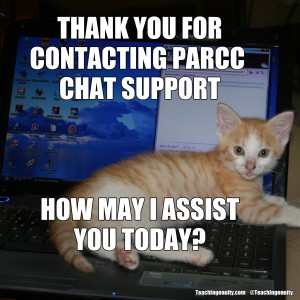
By Dave Janosz, on February 6th, 2015 Photos from the STEM League meet held at Bloomfield High School on February 6, 2015 are now posted.
Below are a few favorites. For the complete album, please click to:
https://flic.kr/s/aHsk8iSbPd
Below is a link to brief video highlights from the competition.
Congratulations to the First Place Team from New Providence High School!
STEM League Bloomfield – February 6, 2015 – Video Highlights
By Dave Janosz, on January 27th, 2015 Videos from the Future City Competition New Jersey Regional held at Rutgers University on January 17, 2015 are now posted!
Congratulations to the First Place Team “Marepolis” from Heritage Middle School in Livingston, New Jersey!
2015 Future City NJ Regional Highlights
Third Place Team Presentation
Second Place Team Presentation
First Place Team Presentation
Keynote Presentation – David Specca – Rutgers EcoComplex
By Dave Janosz, on January 25th, 2015 Photos from the Future City Competition New Jersey Regional held at Rutgers University on January 17, 2015 are now posted.
Below are a few favorites. For the complete album, please click to:
https://flic.kr/s/aHsk7SkA3d
By Dave Janosz, on January 4th, 2015 
Welcome to 2015, the first year of the high tech Partnership for Assessment of Readiness for College and Careers (PARCC) tests, one of two national exams aligned to the Common Core standards. But, while these tests will take place entirely online, they’ll effectively set technology back in schools by the time these tests are first administered in March and May of this year.
Technology leaders in schools understand the benefits of technology in teaching and learning. A student knowing their way around a computer and knowing how to create things with it is as integral a part of college and career readiness as any other type of literacy. Every student today needs a computer simply to do their job of being a student. Students get the most from their learning experience and become the most prepared for their future when they can use computers to create new media and as resources in taking on authentic projects through which they drive their own learning experience. But, in some ways, PARCC is working against its own mission, college and career readiness, due to the inauthenticity of the testing environment and the sheer amount of time that computers won’t be used for more authentic tasks.
Schools are now preparing their systems so that millions of students from the twelve remaining PARCC participating states can take these online exams. Each student will take just a few tests in English Language Arts and Mathematics and each test will take about an hour to complete. But, schools will likely need every hardware resource they have on hand to carry out the online testing. Preparing hardware entails putting almost every computer available in a school in a locked-down kiosk state so that students cannot access the normal parts of the computer during the exam. PARCC security specifications block access to the web and prevent certain functionality such as taking screenshots so that the tests can be kept more secure and more valid. This is despite the fact that every good educator knows that any test that can be beat by Googling an answer just isn’t a genuine test.
While schools have known the hardware needs and expectations for a while now, few have actually added any hardware to accomplish the task of the PARCC testing. From a practical standpoint, this means that ALL of a school’s technology hardware resources may be dedicated solely to this testing for significant amounts of time. Most schools will dedicate their computer labs and carts to testing for weeks or months. Many schools will need to reserve every single lab, laptop, notebook, and tablet in the entire school for up to twenty-five to thirty percent of the school year just so that they can administer the assessments. Staff will need time before each administration to configure and test their technologies for use with the PARCC infrastructure and after each test to return things to their normal state. This all amounts to time that computers won’t be used as they’re best used in schools, as tools that can be used for far more creative tasks.
PARCC has also done a dubious job in how they’ve presented their “sophisticated” online testing environment. They’ve renamed normal computer functions that nearly every student understands by the time they reach kindergarten to ones that sound far more intimidating. Each student will need to know how to use test taking features like the Answer Eliminator (point and click on a button to eliminate an answer), Equation Editor (allows for math notation like superscript), Text Extraction (highlighting), and Solution Set Graphing (clicking points on a graph). To that end, many schools have added more lessons in how to use these and other fancy sounding features in place of other computer instruction.
Some schools have even reintroduced programs that stress using what will soon be legacy tools like a computer mouse and hard wired keyboards. Some districts are buying mice for devices that don’t normally use a mouse as an input device for fear of placing some students at a disadvantage, essentially wasting money on old technology. Instead of using computers as the creative and transformative tools they can be, schools are returning to the skill and drill ways of teaching simple input methods. Again, students will be getting the short end of the stick as they spend more time learning how to use the fancy-sounding PARCC features and outmoded skills, and less time learning things like coding and digital citizenship.
So, while each student may only take a few hours to complete the exams, the repurposing of entire fleets of computers and spending time learning superfluous proficiencies will result in a reversal of what has taken years to realize, that computers are powerful tools necessary in the creation of authentic student projects. PARCC was supposed to be a different kind of test, one that skill and drill won’t help. But, at the end of these tests, students will have honed obsolete skills and students will not have created anything…except answers to a test.
By Dave Janosz, on November 7th, 2014 Thank you for attending the TEEAP Conference. Here are the slides from my presentation.
TEEAP Keynote – November 7, 2014 – Slides
By Dave Janosz, on May 10th, 2014
 Image Credit: Sean Locke Photography/Shutterstock A member of the Massachusetts General Assembly has introduced a measure that would allow for the state’s neediest school districts to draft the most talented new teachers using a format similar to the NFL Draft.
Tom Strassmore (5th District), the bill’s sponsor, believes that the legislation is necessary to force equality in our schools. “We have to ensure that students in schools that may not have the means to attract highly effective teachers have a fair chance to be in classrooms with the best teachers,” said Strassmore at a recent meeting of the state education boards where he announced the proposal.
If adopted, Assembly Resolution number 3874 (AR-3874) would also allow for the creation of neutral site combine events where district officials could preview, interview, and test prospective talent. While a special oversight committee will determine the final locations and format for these combines, several events are recommended in the proposed bill including “ScanTron speed grading,” “hall pass checking,” and “copier jam clearing.” Instead of the 40-yard dash, competing teachers would do the “40-yard dash down the hall to make it to their next class while hurdling backpacks on the floor.”
Statistics and data from student teaching might also be considered. A student English teacher’s average essay grading time or an elementary school teacher’s bulletin board changeover time might be the difference between a first round or third round selection.
Anne Romano, Superintendent of the Pinewood school district, is cautious about the proposal, but also believes that it has some merit. “If we could somehow determine that a teacher has a strong enough bladder to make it through four class periods in a row, it would give us a clue that they’d one day be able to reach at least partially effective status on student growth objectives,” she said.
What might the potential draft day look and be like? Some speculated that the State Education Chancelor might be booed by attending parents when they come onto the stage to announce the first pick in the draft. Expect school board members and administrators from each represented district in a “war room” like setting, reacting to previous picks and pouring over their selection criteria.
“If this goes into effect, we’ll certainly be in a high stakes environment,” said school trustee Len Giordano. “We had better take every opportunity to find the best and brightest.” Giordano also wondered if school districts would be able to use current staff to “trade up” for multiple picks in the draft.
As school officials consider the potential impact, young teachers who heard of the announcement also expressed some concerns. Brandon Wallace, a junior practicum student at Alexander State College, pondered the impact of the potential draft on his social media. He asked, “I’ll have to be extra conscious about what I tweet so I don’t negatively affect my pre-draft ranking.”
Whether some might opt to enter the draft early instead of picking up a Masters degree or special education certification will remain to be seen.
When asked if bill passage might be a precursor to allowing for big signing bonuses, Strassmore responded, “Perhaps, but we probably are some time away from that.”
By Dave Janosz, on April 19th, 2014 Here are some great bridge designs from the Engineers Decide iBook sketch pad drawn by students at Lenape Meadows School on Science Day!
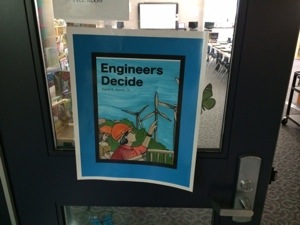


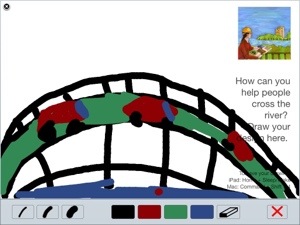
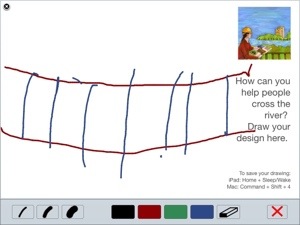
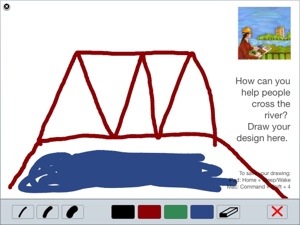
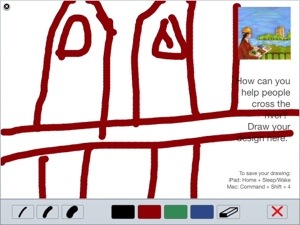

By Dave Janosz, on March 11th, 2014 Today I am presenting a workshop at the NJ Educational Computing Cooperative Annual Conference at Montclair State University. I will be highlighting the development of my iBook “Engineers Decide.”
Here is the PowerPoint handout for the session:
Making and Publishing iBooks from Start to Finish – NJECC 2014
Here are some files you can use to play in iBooks Author for Mac:
iBooks Author Demo Files
Enjoy!
|
|












